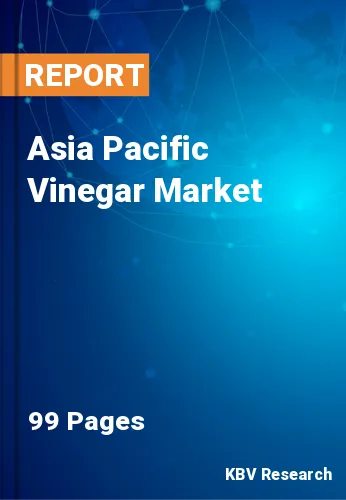The Asia Pacific Vinegar Market would witness market growth of 3.2% CAGR during the forecast period (2022-2028).
Some studies have shown that vinegar may decrease high blood pressure, a risk factor for heart disease. The risk of fatal heart disease was reduced among women who used oil-and-vinegar salad dressing. According to researchers, the ALA or alpha-linolenic acid (an omega-3 fatty acid) concentration of the dressings may have contributed to this. The group that consumed vinegar, which also contains ALA, had greater cardiac protection than those who consumed mayonnaise-based dressings. So, it is probable that the vinegar had a significant role in the result.
Vinegar showed the capacity to kill human leukemia cells and stop the proliferation of cancer cells. Vinegar in drinking water prevents rats from getting colon cancer caused by azoxymethane. (azoxymethane is a chemical that humans mostly use to cause cancer in rats and mice to research cancer therapy and prevention.) The presence of polyphenols in vinegar, which are plant molecules that protect against oxidative stress that may harm cells and cause illnesses like cancer, is one potential explanation.
The use of vinegar improves the insulin response to sugar intake, which has an antihyperglycemic impact on humans. And those who have insulin resistance are considerably more affected by this consequence. Drinking vinegar before a meal high in carbohydrates is known to lower blood sugar levels after the meal. Others claim that drinking vinegar makes them feel more full, which may help avoid overeating and result in undesirable weight gain.
India's agriculture sector has experienced remarkable growth during the past two years. The industry, which employs the vast majority of the country's workforce, made a sizeable 18.8% (2021–2022) contribution to the GVA of the nation, expanding by 3.6% in 2020–2021 and 3.9% in 2021–2022. Promoting organic farming across the country is the focus of Government of India (GOI) initiatives like “Paramparagat Krishi Vikas Yojana” (PKVY) and “Mission Organic Value Chain Development” in North East Region. Also, the government has created a website that will offer organic products directly to consumers nationwide.
The China market dominated the Asia Pacific Vinegar Market by Country in 2021, and would continue to be a dominant market till 2028; thereby, achieving a market value of $519.8 million by 2028. The Japan market is estimated to grow a CAGR of 2.6% during (2022 - 2028). Additionally, The India market would experience a CAGR of 3.8% during (2022 - 2028).
Based on Distribution Channel, the market is segmented into B2B and B2C. Based on B2C Type, the market is segmented into Specialty Stores, Supermarkets & Hypermarkets, Convenience Stores, Online and Others. Based on Application, the market is segmented into Food & Beverages, Cleaning Industry, Healthcare, Agriculture and Others. Based on Source, the market is segmented into Organic and Synthetic. Based on Product, the market is segmented into Balsamic, Red Wine, Cider, White, Rice and Others. Based on countries, the market is segmented into China, Japan, India, South Korea, Singapore, Malaysia, and Rest of Asia Pacific.
Free Valuable Insights: The Worldwide Vinegar Market is Projected to reach USD 6.4 Billion by 2028, at a CAGR of 2.5%
The market research report covers the analysis of key stake holders of the market. Key companies profiled in the report include The Kraft Heinz Company, Carl Kühne KG (GmbH & Co.), Mizkan Holdings Co., Ltd., Eden Foods, Inc., De Nigris Group, Australian Vinegar, Burg Groep B.V., Marukan Vinegar (U.S.A) Inc. (Marukan Vinegar Co., Ltd.), Molson Coors Beverage Company (Aspall Cyder Ltd.) and White House Foods.
By Distribution Channel
By Application
By Source
By Product
By Country
Our team of dedicated experts can provide you with attractive expansion opportunities for your business.

